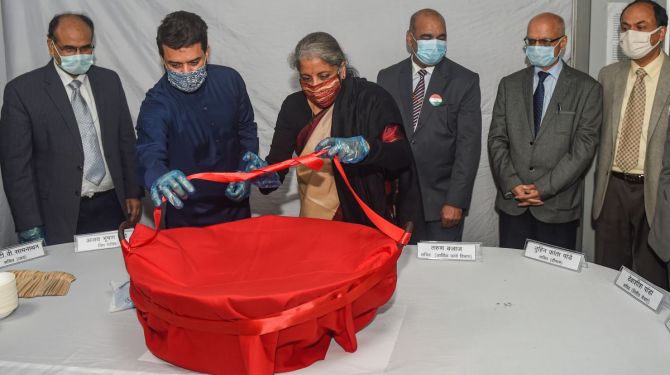That is what you will hear again after Nirmala Sitharaman presents a speech that will prove to be meaningless and numbers that will show themselves to be wildly off the mark, observes Aakar Patel.

\
This will be the Modi government's eighth Budget.
We are told that gross domestic product of goods and services this year, meaning from April 2021 to March 2022, will be 11% more than it was in the period between April 2020 and March 2021.
The Economic Survey last year said that growth would be 6% in the current year.
It turned out to be minus 7.7% instead.
This coming year the government will again get the chance to claim that India is the 'fastest growing economy' because from the minus numbers we will have modest growth of about 2.2% over two years between 2019 and 2022.
This shift from negative to positive will come with the illusion that there is record shattering growth, which is bogus.
The government also said this week that in 2019-2020 growth, which it had earlier said was 4.2%, was actually 4%.
This is the actual trajectory on which we are today.
Indeed, it is lower than that but let us leave that for now.
The point is that this is Modi's eighth Budget.
Can we discern, whether we are Modi haters or Modi bhakts, any idea of a grand narrative or a master plan? The fact is that we cannot.
We have, in the words of a friend who was responding to Modi's national security policy, "some catchphrases, acronyms and advertise-able phases strung together".
Who remembers Make in India? This came with a superb logo of a lion striding boldly forward and a series of events.
The logic of Make in India was that India was overly reliant on services, which while it contributed well over half of GDP only contributed 25% to employment.
By increasing the share of manufacturing, we would have more employment in the formal sector.
Well, manufacturing's share of GDP since the launch of Make in India has actually gone down from 15% to 14% and possibly now 13% after Covid.
Unemployment has naturally followed the opposite trajectory, going from about 4% before Modi to 6% and then 9%.
And this figure is not really accurate because we are at the lowest historical labour force participation rate.
Meaning that the number of people who have no job and are not looking for work, having given up hope, is at the historical highest.
This is the despondency that is resulting in mass movements all over the country as we are seeing in the current time.
To return to the original point, eight Budgets is a lot.
It is more than Narasimha Rao, the great reformer got.
It is as many, more or less, as Vajpayee, who was seen as the great liberaliser got.
People may not know that the Jana Sangh under Vajpayee promised to cap the salaries of all Indians at Rs 2,000 and said that the government would take all income that came over that (details of this are in my last book Our Hindu Rashtra).
Vajpayee also said that the party would force Indians to build homes only on 1,000 square yards of land or less.
From such a Socialist position the same Vajpayee headed a government that was the most privatisation oriented of any that came before it.
Vajpayee's 2004 campaign was headlined 'India Shining' because he believed that his economic policies were strong enough and distinct enough for him to run on them.
He lost the election, but it was not because he was wrong about his policies.
They were, of course, quite remarkable.
Can we say the same about what has happened to India since 2014?
Modi's first head of NITI Aayog was a man who has spent his entire life saying that open and unrestricted free trade was the only way for a nation to quickly grow its economy.
That man, Arvind Panagariya, was left to lament what is today the policy, which is the opposite of free trade.
Aatmanirbharta means import substitution, which in turn means that cheaper foreign imports are taxed at high rates so that Indian companies can sell to Indians are higher prices.
Is this good economics? Panagariya says no, but this is what we are now doing, a 180 degree turn from where Modi had started.
Eight Budgets is sufficient time, more than sufficient, to at least be able to establish a grand narrative.
This is where India was and this is where we are headed and this is how we will do it.
Nobody today, including those inside government, can fill in the blanks of this sentence.
This is not because the policy and narrative are too complicated to describe.
It is because there is no grand policy.
It is being made up and shifted and changed and even reversed as we go along.
There is the conviction that THIS particular Budget will be the 'game changer' that India has always waited for.
That is what you will hear again after Nirmala Sitharaman presents a speech that will prove to be meaningless and numbers that will show themselves to be wildly off the mark.
But we will continue on, bumbling in this fashion, not mindful of what has happened over the last eight Budgets.
Aakar Patel is a columnist and writer and you can read Aakar's earlier columns here.
Feature Presentation: Aslam Hunani/Rediff.com











 © 2025
© 2025